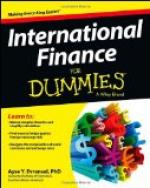borrowing for naval and military needs; though even
in time of war, if we could imagine an ideal State,
with every citizen truly patriotic, and properly educated
in economics and finance, and with wealth so fairly
distributed and taxation so fairly imposed that there
would be no possibility of any feeling of grievance
and irritation among any class of taxpayers, it would
probably decide that the simplest and most honest way
of financing war is to do so wholly out of taxation.
In time of peace, borrowing for expenditure on defence
simply means that the cost of a need of to-day is
met by someone who is hired to meet it, by a promise
of interest and repayment, the provision of which
is passed on to the citizens of to-morrow. It
is always urged, of course, that the citizens of to-morrow
are as deeply interested in the defence of the realm
that they are to inherit as those of to-day, but that
argument ignores the obvious fact that to-morrow will
bring its own problems of defence with it, which seem
likely to be at least as costly as those of the present
day. Another objection to lending economically
backward countries money to be invested in ships,
is that we thereby encourage them to engage in shipbuilding
rivalry, and to join in that race for aggressive power
which has laid so sore a burden on the older peoples.
The business is also complicated by the unpleasant
activities of the armament firms of all countries,
which are said to expend much ingenuity in inducing
the Governments of the backward peoples to indulge
in the luxury of battleships. Here, again, there
is no need to paint too lurid a picture. The
armament firms are manufacturers with an article to
sell, which is important to the existence of any nation
with a seaboard; and they are entirely justified in
legitimate endeavours to push their wares. The
fact that the armament firms of England, Germany, and
France had certain interests in common, is often used
as a text for sermons on the subject of the unpatriotic
cynicism of international finance. It is easy
to paint them as a ring of cold-blooded devils trying
to stimulate bloodthirsty feeling between the nations
so that there may be a good market for weapons of
destruction. From their point of view, they are
providers of engines of defence which they make, in
the first place, for the use of their own country,
and are ready to supply also, in time of peace, to
other nations in order that their plant may be kept
running, and the cost of production may be kept low.
This is one of the matters on which public opinion
may have something to say when the war is over.
In the meantime it may be noted that unsavoury scandals
have occasionally arisen in connection with the placing
of battleship orders, and that this is another reason
why a loan to finance them is likely to have an unpleasant
flavour in the nostrils of the fastidious.




